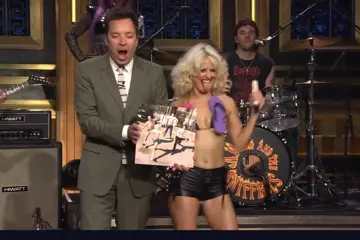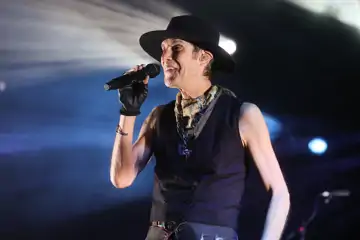When not lecturing young girls on losing their virginity outside of marriage or diving into her bottomless money-pile like Scrooge McDuck, Twilight typist Stephenie Meyer still works as a writer: The Host marking her next saga out to tap into the seemingly endless cultural appetite for tween-friendly tales of budding adolescent hormones and mystical Chosen One bullshit. Here, the set-up goes: a host of alien beings have transported to Earth, and colonised the planet by inhabiting the bodies of humans. In an opening voice-over gambit set to a 3D animation of Earth that looks like a home-made screen-saver, starlet Saoirse Ronan talks about how these interloping aliens have stemmed environmental degradation, staved off global hunger, brought in peace and goodwill amongst all men, and rid the planet of the scourge of advertising, all products now waiting, free-to-have, in the aisles of the functionally-titled Store. So, wait, what's the downside? From there, The host can never convincingly make a case that we should be cheering on the humans to rid themselves of this occupation; no matter the fact that everyone now wears matching white suits, drives matching gleaming-silver luxury cars, and speaks in a detached monotone.
Well, everyone except for Ronan, that is. She's one of the few humans so feisty that they 'fight' this invading species; their 'host body' being hostile to the occupying alien. On the page, Meyer writ this internal struggle as internal dialogue, an endless back-and-forth between human and alien taking place inside the head of its narrator. Here, well, it's far more awful, and utterly clunky. As Ronan goes about as inhabiting alien, the interior voice of the trapped human, Melanie, is ringing in her ears; piped in with plentiful reverb and maintaining the consistency of a pissed-off, snarky teenager delivering a running, sarcastic commentary. “Yeah right! She is so full of it!” 'Melanie' spits re: Diane Kruger's alien overseer, who comes trussed in high-waisted white trousers that always seem in danger of ruffling the perfect façade of this utopian future with a visible panty line. And so the film progresses, Ronan looking blank or pulling scrunchy-faces whilst talking to herself, or, more often, suffering from this annoying narrator ricocheting around in her head.
Eventually, Melanie and her occupying foreign host, Wanderer, come to co-exist; making them the first original-odd-couple buddy-cop tag-team contained inside the one actor, and the film itself an essential portrait of a functioning schizophrenic. The two competing voices don't displace the central narrative of body/mind/existence, but turn human/alien into sparring partners on-the-lam together, out to escape the omnipresent, obsessed Kruger and reunite with the love-interest and younger-brother that Ronan lost when she was captured. With the aliens “outnumber[ing] them a million to one!”, humans are occasional rag-tag bands living far on the fringes; driven into the desert like the Mormons out of Missouri. Which leads into a sequence of re-frontierdom, where William Hurt ambles about as poor-man's Jeff Bridges - all drawl, beard, ponytail, cowboy hat, and shotgun cockily tossed over shoulder - playing an Uncle Jebediah(!) who has fashioned a functioning community - complete with indoor wheatfield, mirrored sunroof, hot springs day spa, and their very own glow-worm room - underneath a desert mountain. Sure, they may be hiding out in caves like scattered Taliban, but, hey, they're still doing it with American ingenuity and luxury; with their dusty Amish outfits contrasting, heroically, with the impractical all-whites of the aliens.
From there, The Host falls into familiar Twilight territory: bad flashbacks, silly villains, dialogue as tedious exposition, glowering men, virginal handwringing, and a central love-triangle where a flip-flopping, morally-torn heroine must juggle twin suitors jockeying to be her abusive boyfriend (one hits her, the other strangles her; oh, and a third tries to kill her, only for Ronan to play silent to protect him, even though she's the one who has to “live under the same (cave?) roof as him”). There's actual “in two minds” jokes herein, and actually a scene in which Ronan, as alien, kisses one beefcake, then switches to human mode to kiss the other like totes hot boy she like like likes. The schizophrenic pair never quite get their shit together enough to go on a 'double date' with the two dudes, which is a shame, as I'm wondering how Meyer could turn double-penetration into something symbolic of Latter-Day Saints teachings. As we ricochet tediously around the triangle, the dialogue is heaving and horrendous (“when you touch me... I don't want you to stop!”), matched only by the overwrought, cello-scraping Antonio Pinto score; each matching equivalents of emotions spelt-out painfully. This makes The Host Meyeresque in most familiar fashion: the tenor of nascent adolescent sexual experience again captured by a hysterical tenor, yet seeming utterly conservative at heart. When flashback Ronan and Beefcake #1 bone as 'possibly the last two people alive', the film essentially suggests that losing your virginity is the dramatic equal to the end of the species; making this another case of Meyer marshalling mystical mumbo-jumbo to mythologise fucking for those who've never done it.
The synopsis for Rust And Bone doesn't sound like much: an Oscar winner loses her legs in a horrific accident, then learns to live - and fuck! - again thanks to the love of a good man. Well, a kind of dickish, damaged, deadbeat-dad man, really; a bare-knuckle, black-market boxer who's done a lot wrong, but for our heroine serves as a Mr. Right. Yet, the film is no generic prestige picture (as the fact it was largely overlooked in the Awards season essentially attests), but, blessedly, the latest flick for Jacques Audiard, the French filmmaker whose career has been filled with works that prove to be way better than they synopsise. By premise, Read My Lips, The Beat My Heart Skipped, and A Prophet all sound like generic crime movies. And Rust And Bone, too, may dabble in crime; may, in Matthias Schoenaerts' desperate fighter, find a man who's lived his whole life skirting across lines of legality. But, here, the lawlessness is merely a setting for what is, really, a piece of visceral cinema set to Bon Iver jams. Rust And Bone's title - its decay, its base biology - embodies the bodily quality of the picture; this a story about human physicality as a vessel of individual history. The body is, herein, both a miracle and a form of suffering: Marion Cotillard finding her form radically disfigured in a single, calamitous, horrifying instant; Schoenaerts gradually destroying his body by suffering under the martyred yoke of a life in bloodsports. They serve as reflective inspirations for each other: les amoureux as fighters, drawing the strength to struggle - to persist in a life so often degrading - by the spirit, and the body, of the other.
And, befitting a film about the physical form, Rust And Bone doesn't shy away from its fucking. Or, therein, from shots of the stumps left behind after Cotillard's legs were crushed by killer whale (no, really). Of course, there's not quite a full suspension-of-disbelief in this: it a natural impulse to stare, intently, at the empty space where her legs are, to gawp at the digital editing that's erased her award-winning gams. Yet Cotillard battles against the blowback of digital dissonance; takes a role that, in other hands - or, y'know, pixel-excised legs - would've been a simple turn of victimisation-turned-heroism, and instead makes it complex, contradictory, vulgar, visceral, seductive, snarling, self-destructive, wanton, wounded, wolf-whistle-worthy. The film's money shot may be the moment in which she returns to the scene of her horror, and re-bonds with an apologetic Orca in semi-mystical, borderline-Free-Willy-esque fashion, but its most telling scene is when Cotillard arises out of a van, flounts the rule of no-ladies-at-the-underground-fighting-ring, and wobbles across the backlot gravel on artificial legs like some defiant cyborg; Cotillard a striking figure one part newborn deer on ice, one part unstoppable colossus. Audiard, gladly, doesn't overplay it, but it's the film's real moment of true cinematic frisson; his leading lady rising to an instant of hard-won pride, refusing to remain in the shadows, now out to stand side-by-side - body-by-body - next to her man.
Hyde Park On Hudson operates under the presumption that tedious dramatic developments are interesting if played out by famous people. It's the kind of presumption that runs rife in the realm of the prestige-picture; Oscar-bait pictures forever lining up based-on-a-true-story historical tales that trade, tediously, in the celebrity of its characters. Here, Bill Murray wears false teeth as FDR and Laura Linney is the cousin who secretly gave him handjobs and Olivia Williams is Eleanor Roosevelt who (wink wink) preferred the company of the ladies. The story involves The President - and, seriously, someone says “The President” roughly a billion times herein - hosting the (stuttering!) King and Queen of England at his country house, on the eve of World War II, at the tail end of The Depression; hence, period-piece manners and outfits and frocks and etc. Audiences are surely supposed to find it positively Delightful! to see those once-distant figures of royalty humanised. But it's positively dull; somehow making international diplomacy and pre-war politicking and presidential scandal seem like unthreatening water-colour memories; all its syrupy string music and tasteful appointage and jolly folksiness out to not ruffle a single feather.















